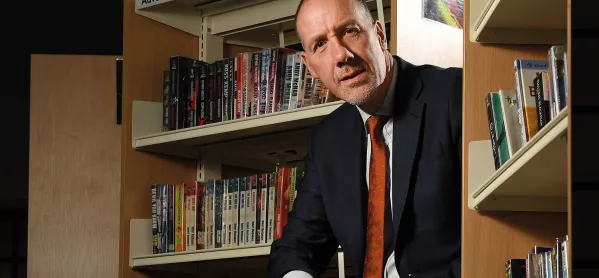- Home
- ‘Never forget the human consequences of funding cuts’
‘Never forget the human consequences of funding cuts’

One of the privileges of my job is that I get to meet a lot of people. And one of the questions they often ask me is: “What are the main issues for your members at the moment?”
It’s an easy question to answer: funding.
There are other concerns of course - the consequences of the deepening teacher recruitment and retention crisis, the anxiety caused by England’s overbearing accountability system, and a feeling of an education system splintered by competition rather than driven through a collective mission.
But funding is the number one issue - for primary, secondary, and post-16 colleagues.
From those in power, there’s simply denial. It’s hard to get much of a government response beyond the mantra that school funding is at record levels. Never mind the fact that this is driven by an increase in pupil numbers and that in real terms funding has been cut by £2.8bn since 2015.
In reality, when faced with the need to make substantial budget cuts you have only one option. You have to lose staff because they make up more than 80 per cent of your expenditure. And the mechanism for reducing staffing is bleak - you cut courses, you increase class sizes, you reduce what you can offer within and beyond the classroom to the children.
This has real consequences, and we’re seeing in particular how arts subjects and modern foreign languages are being cut back in too many schools and colleges.
But it’s difficult for any individual leader to talk about this publicly for fear that if they say they have had to cut GCSE drama or A-level German, it may put off parents from sending their children to the school, thus worsening the crisis.
Human impact
So we have to find ways of telling that story. We have to show that the funding crisis is far more than an argument about figures. We have to show the human impact. And that is a job for organisations like ASCL, working alongside school leaders, to provide real-life examples of the consequences of the funding crisis.
Let’s start here.
I was visiting a school in the Midlands recently. It’s an inspiring school with a committed staff serving one of the most deprived communities in the UK. And there I met a Year 7 pupil who plays the trumpet.
He’d chosen this school, he told me, partly because his brother had gone there, but also because this was a school that had always specialised in the arts. As he put it: “When I came here, I saw that they had music which I’m really into and drama, because I’m a really dramatic person, and they also have a swimming pool.”
He talked about the school with great pride and great confidence. Then he told me of his gift for music, of joining the school choir, getting a chance to play the guitar, of being able to “do trumpet”. Part of the thrill, it was clear, wasn’t just that the school had unlocked a talent he didn’t know he had but that he had also got - as he told me with wide-eyed pride - to play in the school’s orchestra.
And, at this point, he welled up unexpectedly. It became clear that he was no longer doing trumpet.
Just as the school has had to close off the swimming pool because it can’t afford the running costs any longer, it has cut various arts courses at GCSE (such as dance) and in the sixth form, and realised that it can now only sustain specialist music tuition for pupils by charging parents.
As the Year 7 boy put it: “My mum said I couldn’t continue it because it’s £50 per term and also my brother has music lessons and she couldn’t pay £100 per term for both of us”.
I asked: “Have you stopped playing the trumpet?” He cried. “Unfortunately, yes.”
Bleak decisions
Here, on the watch of a government that talks of social mobility, we’re seeing the human consequence of the decisions governors and school leaders are having to take.
Headteachers describe to me the heartbreak of dismantling what was once a distinguished tradition of our schools - the arts provision, the commitment to a broad curriculum, extracurricular opportunities in sport and the arts that helped nurture the talents of children from every background.
Funding is not just some arid discussion of spreadsheets or efficiency savings or financial planning. Ultimately, it’s about values. Because every decision about what we cut is stripping out something that was once important.
And in that boy’s case, the consequence of the government’s denial of a real-term funding reduction is that a child from one of the UK’s poorest neighbourhoods, a talented boy from a disadvantaged background, used to do trumpet and now doesn’t.
Thus the rhetoric of social mobility withers in a world of terrible, bleak human decisions.
Geoff Barton is general secretary of the Association of School and College Leaders. He tweets @RealGeoffBarton
Keep reading for just £1 per month
You've reached your limit of free articles this month. Subscribe for £1 per month for three months and get:
- Unlimited access to all Tes magazine content
- Exclusive subscriber-only stories
- Award-winning email newsletters



